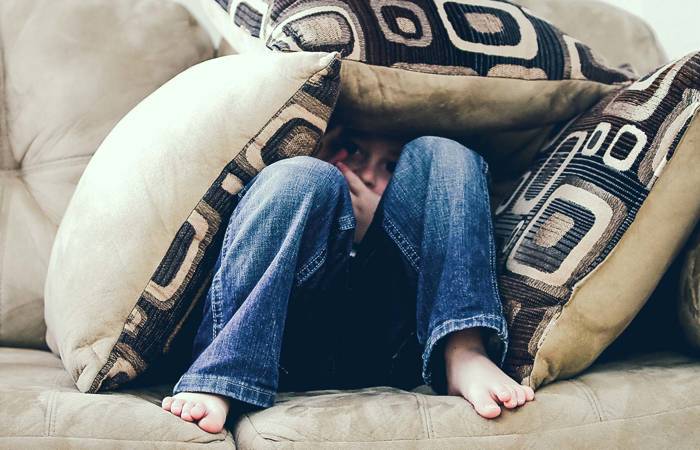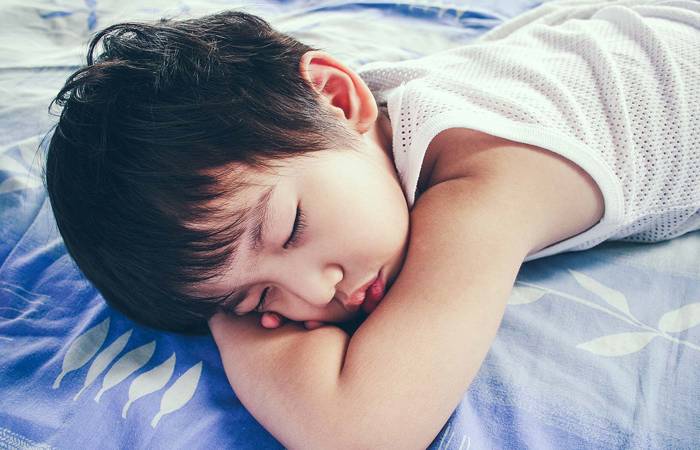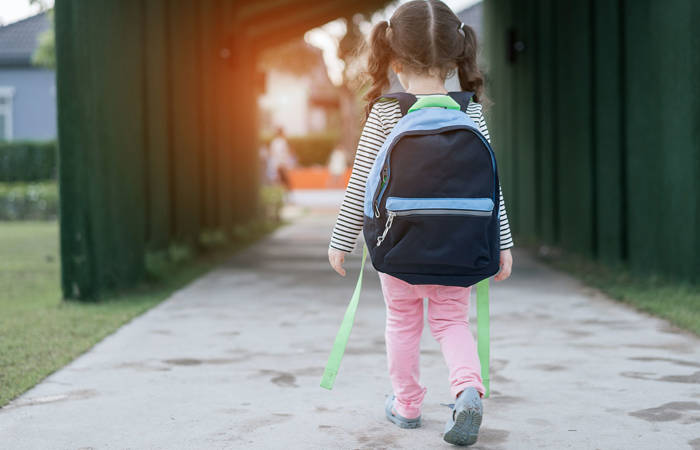Like what you see?
Sign up to receive more free parenting advice.
Thank you for subscribing to our newsletter!
Child Development

iStock.com/wundervisuals
Dr Justin Coulson is the co-host of Channel 9’s Parental Guidance, a three-time bestselling author, a TEDx speaker, and one of Australia's most popular parenting experts. In this article he looks at ways to reduce pressure and help children handle fear with confidence.
Most adults would probably agree that life usually makes sense. Sure, from time-to-time things can be a little topsy-turvy and confusing. We don’t always get what we want. But generally, we accurately perceive what’s going on and we are comfortable with navigating whatever life throws at us.
For our children, however, most of life is a blur of unexpected randomness and unpredictable volatility. Life, for a toddler or preschooler, doesn’t make much sense.
Wearing psychological “L” plates
Have you ever noticed that you can cover your face with your hands, then open your hands and say “peek-a-boo” no less than 200 times in a morning and your little one still laughs in surprise?
Have you discovered that your child has to put everything into their mouth, regardless of whether it is food or stuff that is definitely not food?
Have you identified that your child doesn’t respond well to “no”, regardless of how carefully you try to prepare them for it, or how often you’ve said it before about the exact same thing?
Our children’s brains develop based on experience. And since they have so little experience, their brains need repetition before they understand what’s going on. Otherwise, everything is gobbledy-gook.
Creating security
Because nothing really makes sense, our children are biologically built to require security and predictability. When things are predictable and secure, our children feel as though life is safe for exploration. They want to branch out, spread their wings, experience new adventures.
When life is random, volatile, and unpredictable, the disorder they experience undermines their feelings of safety. As soon as this happens, most children look - immediately - for a secure base to which they can return. Usually their parent acts as that safe haven. We hold them, help them regulate their heart and blood pressure, soothe their amygdala override (fear response), and then gently encourage them to stretch their horizons once more.
Why our children don’t want to face their fears
There are a number of reasons that your child will be highly reactive. Whether it’s day one at preschool/daycare, they’re afraid to climb the slippery dip at the park, or they don’t want to let go of your leg and play with their playmate, you’ll find the following reasons account for much (though not all) of their reluctance and fear:
Nothing makes sense
Early learning and care can feel unsafe and unpredictable. Kids are wired to be close to us and we’re leaving them behind. The park can be intimidating. The ladder is so high and scary. The “friend” isn’t smiling at me. What if they don’t like me?
A lack of experience in novel situations means that our children have no idea what to expect. This makes things volatile and random. This is scary for children. They don’t want to face their fears alone.
Facing fears flies in the face of biology and evolution
Children have been designed to stay close - very close - to their primary caregiver as much as possible during the early years. They need proximity to a familiar, secure, predictable loved one. Shifting them from this, regardless of how necessary it might be, ignores thousands of years of genetic programming.
Separation Anxiety and Attachment Hierarchy
Separation anxiety typically peaks between 10-18 months. But it can last until around the age of three for many children and in some cases, longer. During this time, our children want the person they’re most consistently and securely attached to: usually mum. Those further down the “attachment hierarchy” struggle to make the same connection, which means that big tantrums happen. The child feels vulnerable and unsafe.
Temperament
Children are usually classified as being either easy, slow-to-warm-up, or difficult. The definitions are as self-explanatory as you might imagine. Easy children respond to new environments easily. Difficult children hate anything that pulls them from mum’s loving arms. Slow-to-warm-up children start off clingy but generally become more comfortable with time.
Parental Baggage
Sometimes our children don’t want to face their fears because they feed off our energy. If we are anxious, they’ll catch it. If we are cranky, or chaotic, or even a little bit crazy, they’ll catch that! Our overprotective and controlling behaviours will increase anxiety - for them and for us.
HALTS
Some predictable triggers for challenging behaviour, and particularly for resistance to our efforts to help our children grow, are feeling Hungry, Angry, Lonely, Tired, and Stressed. If our child is feeling any (or all) of these, they’re not going to respond well to early learning and care drop off, a big adventure in the park, a playdate, or anything else new or unexpected. It’s all too scary when their system is already on overload.
Sometimes our children won’t face their fear because of one or all of the above. Sometimes it is something else entirely. The real question to answer is how do we help them navigate their way through novel or unexpected situations?
Because nothing really makes sense, our children are biologically built to require security and predictability. When things are predictable and secure, our children feel as though life is safe for exploration. They want to branch out, spread their wings, experience new adventures.Dr Justin Coulson
Stay up to date with the latest news and articles from First Five Years
Thank you for subscribing to our newsletter!
Facing Fears with Confidence
The following five ideas will help you guide your child as they encounter unexpected situations:
Let them!
For children to face fears, we have to be comfortable with them actually facing those fears. Research shows that parents who are overprotective experience higher personal anxiety and their children also experience higher anxiety. Conversely, parents who maintain a modest level of comfort with their child feeling discomfort will generally be more likely to allow their child to test boundaries, explore limits, and face fears.
Avoidance reinforces anxiety. Rather than telling a child they don’t have to do daycare, play with a friend, or ride the slide, wise parents will recognise the growth that comes from facing adversity. They will respond with compassion and understanding, offering gentle support and encouragement so their child will move forward through their fears.
It is important to highlight that this doesn’t all have to happen at once. Sometimes a child might take several attempts over an extended period before they’re ready to take the plunge and face their fears. An example could be swimming lessons. From a child’s perspective, we’ve rushed swimming. It’s loud. It smells. It’s cold. There are strangers. Your child is being separated from you. It’s. A. Lot. However, over time, and with tender support and involvement, your child can become comfortable and overcome their fears - if you let them.
Give them the lead
When a child feels empowered, she is far more likely to take control of a situation and express herself more fully. By asking, “what do you think?” or “how do you think we should move forward from here?”, we anticipate a progress-oriented solution but hand the power over to our child to determine an appropriate way forward. This does not mean they receive unilateral control. It means, however, that as they present suggestions, we work with them to develop the confidence to proceed in a way that feels good to them.
Give transition time
Warnings make a tremendous difference for children when they are going to need to adapt to a new circumstance. Saying things like “We start our new kindy next Monday”, or “Only 15 minutes until we’re finished at the park” facilitate children’s ready adaptation to what is coming, allowing adjustments that help them face discomfort or fear.
Further ideas that extend this into the early learning setting could include establishing routines (as children love security and predictability), helping them become familiar with their new teacher or surroundings (if they’re starting somewhere new), and role-playing situations that can be uncomfortable so they feel more secure in what is coming.
Reduce pressure
When a child is anxious and fearful, emotions are high. Tunnel vision takes over. Fight or flight mode (or freeze or fawn) kicks in. Children stop listening. Survival is their focus. When this occurs, slow things down and take the pressure off. Try the following steps:
- Reassure your child that you can see they’re concerned. (This is called recognising your child’s emotion.)
- Reframe the emotion in your own mind as a chance to connect, rather than to correct.
- Restate the emotion so your child knows what they’re feeling has a name. If you can name it you can tame it. If it’s mentionable, it’s manageable.
- Reaffirm that you’re there to help, not fix. When they know you’re staying, their emotions balance.
- Resolve by empowering your child to develop a plan to move things forward.
Be a model
Children learn to face their fears best by either facing fears themselves or by seeing us face our fears. Be honest with your child about things that worry you but let them see that your fears don’t stop you from trying. Let them hear your self-talk as you remind yourself, “Sometimes things can be a bit scary but I’m brave, and I’m going to figure out how to do this.” Your example of stretching your own comfort zone and providing your child with the same opportunities will help them face their fears with confidence.
Bonus tip - Explicitly teach about courage
In Season One of the Channel 9 television reality series, Parental Guidance, 10 sets of parents were asked to help their children to face their fears. Rach and Sam, self-identified helicopter parents, saw their 5-year-old daughter pull back in fear at the thought of jumping off a 5m diving platform into a pool. Sam looked at his girl and asked, “What does it take to be courageous?” Her response was well rehearsed from several years of explicit teaching: “One second of courage to be brave
Sometimes it’s good to be afraid
It is important to acknowledge that sometimes fear is important. It exists to keep us safe. There are some things in life that deserve our unquestioned fear. We must teach our children about these things and encourage them to listen to their inner voice so they can be safe. But we must also teach them to be discerning so they understand what is to be feared and when it’s more powerful to push through with one second of courage.
Fears can hold us back - and they can prevent our children from experiencing a whole, complete, and fulfilling childhood. But when we understand why our children are afraid, work with them on being courageous, and model healthy resolve to overcome our own fears, we are likely to see our children embrace life, grow through challenges, and discover expanded horizons.







